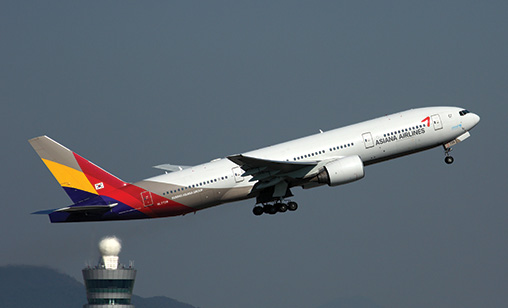News Backgrounder
North Asia conflicts hurt region’s carriers
April 1st 2017
Escalating tensions between China and South Korea over the deployment of a U.S. Terminal High Altitude Area Defense (THAAD) missile defence system in South Korea are taking their toll on the region’s airlines. Read More »
Travel curbs imposed by a disgruntled Beijing on Mainlanders booked to visit South Korea are likely to result in more than US$5 billion in immediate revenue losses at South Korea’s airlines and travel firms, Goldman Sachs has forecast.
 |
The China National Tourism Administration ordered Mainland tour operators to stop selling tours to South Korea from March 15 or face “severe punishment”. China is South Korea’s most important inbound tourism market. More than eight million Chinese travellers visited the country in 2016. Mainland Chinese travellers account for more than 85% of tourists on the island resort of Jeju.
When tensions first flared in the final months of 2016, international passenger arrivals on Jeju declined from 1,661,777 in October to 1,376,446 in November, reported Sabre’s Airline Solutions practice. Carriers in China and South Korea immediately adjusted capacity from 2,622,012 available seats in October to 2,249,575 in November.
Since then the situation has worsened. From March 15, many online travel agents such as China’s Ctrip have pulled South Korean offerings from their sites and both Mainland and South Korean carriers have been forced to reduce their networks.
South Korea’s budget carriers have long reaped the benefits of undiminished Mainland tour operator demand, both through aggregate bookings on their scheduled flights or chartered services. These golden years have evaporated, at least for now.
South Korean LCC, Eaststar, said it would temporarily halt flights from Cheongju to Harbin, Ningbo and Jinjiang from March 15 to October 28 because of “worsening relations”. T’Way Airlines said it would “significantly” curtail its network to the Mainland and Jin Air, a Korean Air subsidiary, has cancelled services from Jeju to Shanghai and Xian. Jeju Air said its request for charter flights to Ordos in Inner Mongolia in March was rejected by China.
Spring Airlines, the Mainland’s largest LCC, cancelled flights from Ningbo to Jeju due to “changing market conditions”. A Spring spokesman said the tourism and airline industries would be “markedly affected” by the on-going situation between China and South Korea and added more adjustments to its schedule remained likely.
China Eastern Airlines has terminated services from Ningbo to Jeju and Cheongju from March 15 and is considering more cutbacks. Okay Airways has cancelled its Nanjing-Jeju route.
At press time, 22 carriers operated Sino-South Korea flights. The biggest players in the market are Asiana Airlines (22%), Korean Air (20%), China Eastern Airlines (15%), and China Southern Airlines (12%).
As a result of these “sensitive issues burdening the aviation industry in Korea”, Asiana told Orient Aviation it would pull “most” of its wide body capacity that was scheduled for flights between China and South Korea and would redeploy to Japan and Southeast Asia.
Under its initial contingency plan, the Star Alliance member said it would cancel 90 flights on 12 routes from March 15 to April 30, including 21 frequencies on the leisure-heavy Incheon-Guilin route, 16 flights between Incheon and Dalian, ten on the Incheon-Jinan route and eight services from Muan and Beijing and Jeju and Beijing, respectively.
South Korea’s largest carrier, Korean Air, will eliminate 79 flights on twelve routes to China during the period, which is 6.5% of its Mainland capacity.
As political conflict escalated between China and South Korea, South Korean companies based in China have reported cyber-attacks, store closures and fines. State-controlled media in China has called for a boycott of South Korean goods and services. South Koreans have retaliated with their own boycott of popular Chinese products such as Xiaomi smartphones and Tsingtao Beer.
“Some people are automatically thinking, the current situation is not good, there is discrimination against us, so we shouldn’t go. The recent actions of [the South Korean government] have hurt many Chinese citizens,” said Che Shanglun, chairman of Xiamen Airlines. The airline boss said the carrier had 10%-20% fewer bookings on its flights to Seoul and Jeju since the crisis became more aggravated.